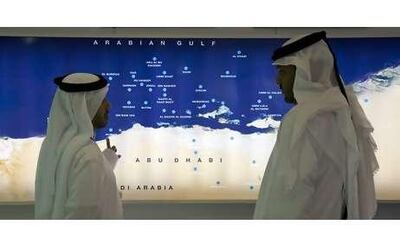The under-fire BP chief executive Tony Hayward's recent visit to the Middle East may mark a new chapter in the long-running relationship between this region and the supermajor oil companies. "We have been partners with BP for years," said Sheikh Mohammed bin Zayed, Crown Prince of Abu Dhabi and Deputy Supreme Commander of the UAE Armed Forces, after meeting Mr Hayward. Kuwait, Saudi Arabia, Qatar and Libya had also been linked with possible investments in BP, designed to shore up its finances after the Macondo oil spill.
The relationships of the major oil companies in the Middle East have gone through three major phases. In the first stage, up to the early 1970s, the largest oil companies, the so-called Seven Sisters including Royal Dutch Shell and what are now ExxonMobil, Chevron and BP, dominated. These corporations took the lead in discovering and developing oil across the region, starting in Iran and Iraq and moving to Saudi Arabia and Kuwait by the 1930s and, by the 1950s, into what is now the UAE.
In the second phase, played out from the 1970s, the Middle East countries grew increasingly unhappy with their share of oil revenues and lack of control over their natural resources. The oil industry was largely nationalised and giant state firms such as Saudi Aramco, Abu Dhabi National Oil Company, Kuwait Petroleum Corporation and National Iranian Oil Company emerged. The majors clung on with small shares in places where their technical skills were still seen to be useful, notably the UAE and Oman.
The early part of the past decade saw the scene set for the third phase. For a variety of reasons, international oil companies (IOCs) are returning. Iraq needs them to rebuild its shattered industry. Iran would be in a similar position if sanctions and domestic politics were not an almost insurmountable obstacle. Kuwait wants to boost output, tackle difficult heavy oil resources and develop gas for its domestic consumers. Oman and Bahrain are looking to turn around declining oil and gas output in mature fields.
Qatar has gone furthest, in its successful quest to become the world's largest liquefied natural gas (LNG) exporter. In Abu Dhabi, the supermajors never left but their involvement is changing. The emirate's gas production has struggled to keep up with fast-growing local demand for electricity, water and petrochemicals. Important deals to develop expensive "sour" gas reserves have so far not been concluded.
Even more important is the tricky question of how to replace the legacy concessions. Japan's Cosmo Oil renewed its licence for 30 years in May. The big two concessions - Abu Dhabi Company for Onshore Oil Operations (ADCO) and Abu Dhabi Marine Operating Company (ADMA-OPCO) offshore - involve most of the supermajors. Shell, ExxonMobil, Total and, as Sheikh Mohammed observed, BP, have been there since 1939. These licences expire very soon for this long-lived industry: ADCO in 2014 and ADMA in 2018. Continuing uncertainty over renewal hampers investment and exploration.
Abu Dhabi faces a tricky choice: whether to keep the original partners; introduce some new ones; or split up the concessions into field-by-field units for which contenders could bid separately. Abu Dhabi's hydrocarbon riches and political stability would make the IOCs salivate as they did over recent Iraqi auctions. Potential partners would probably accept very tough terms to participate. To balance out drilling in deep water or challenging countries such as Nigeria, Russia or Iraq, IOCs need some large, low-risk investments, much like dull but secure government bonds for an individual's portfolio.
But Abu Dhabi will be very choosy about potential new entrants. Some contenders have already emerged. The International Petroleum Investment Corporation (IPIC) owns 20 per cent of Austria's OMV, which OMV's Middle East director Klaus Angerer sees as a point in the company's favour. Occidental enjoys a close relationship with Mubadala Development, a strategic investment company owned by the Abu Dhabi Government, through joint ventures in Bahrain, Oman and through the emirate's gas supplier Dolphin Energy. Occidental won deals for two small fields in October 2008.
This is one part of the new relationship between host country and international oil companies. The oil-rich states do not need money any more. They can handle routine fields themselves but welcome the IOCs where they have special skills or can improve efficiency. Middle East oil producers are looking for something more. For Qatar, this was access to global LNG markets. Abu Dhabi appears to be interested in wider business relationships, including overseas partnerships and direct equity stakes in the IOCs.
The most interesting question, with virtually all of Abu Dhabi's oil and gas exports going to Asia, is whether customers other than Japan will emerge as partners in the emirate's fields. Chinese companies, who were big winners in the Iraqi auctions, have long sought positions in Iran and Kuwait and have entered gas exploration in Saudi Arabia and Qatar. Conversely, despite strong historical and cultural links, Indian oil companies have little presence in the Gulf.
The large-scale entry of Asian oil companies would break the cosy oligopoly of the western supermajors. Yet the Chinese and Indian state companies offer little technically to a sophisticated operator such as Abu Dhabi. Politics and the allure of fast-growing markets would have to override narrower business considerations. So the third phase of IOC involvement in the Middle East has been shaped by high oil prices and limited access to other promising petroleum areas. BP, which in the 1950s would have gone to Tehran or Baghdad to make demands, now visits the Gulf asking for support.
The company knows, like all the supermajors, vast prizes remain here - but only for those that can adapt to new realities. Robin M Mills is a Dubai-based energy economist and author of The Myth of the Oil Crisis

